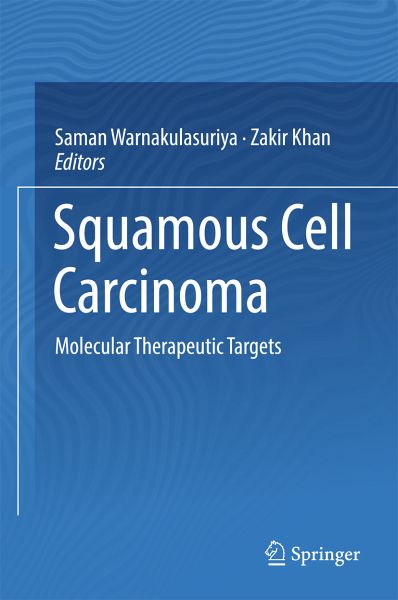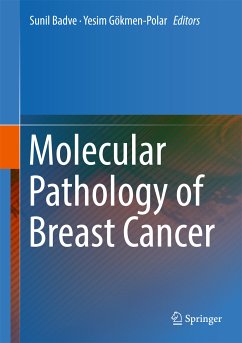
Squamous cell Carcinoma (eBook, PDF)
Molecular Therapeutic Targets
Redaktion: Warnakulasuriya, Saman; Khan, Zakir
Versandkostenfrei!
Sofort per Download lieferbar
112,95 €
inkl. MwSt.
Weitere Ausgaben:

PAYBACK Punkte
56 °P sammeln!
This edited volume is about novel targeted therapies for the treatment of advanced neoplasms of the head and neck (HNSCC) with particular reference to oral squamous cell carcinomas and covers specific fields of cancer genetics and genomics for personalized medicine.The landmark studies from the HNSCC Cancer Genome Anatomy (TCGA) and the cancer Genome Atlas 2015 have revealed the multiplicity and diversity of genetic alterations in HNSCC. This remarkable body of information has elucidated novel druggable targets (eg. EGFR, mTOR, p53, survivin and aberrant microRNA) for therapeutic interventions...
This edited volume is about novel targeted therapies for the treatment of advanced neoplasms of the head and neck (HNSCC) with particular reference to oral squamous cell carcinomas and covers specific fields of cancer genetics and genomics for personalized medicine.
The landmark studies from the HNSCC Cancer Genome Anatomy (TCGA) and the cancer Genome Atlas 2015 have revealed the multiplicity and diversity of genetic alterations in HNSCC. This remarkable body of information has elucidated novel druggable targets (eg. EGFR, mTOR, p53, survivin and aberrant microRNA) for therapeutic interventions in head and neck cancer.
Readers will discover the importance of the biology and pathology of squamous cell carcinomas, the role of cancer stem cells and other factors that contribute to resistance to curative therapies such as hypoxia. We present an in-depth analysis of the HNSCC oncogenome describing the distinct molecular alterations in squamous cell carcinomas, which participate in specific molecular pathways whose dysregulation may contribute to most HNSCC cases. Final chapters of the book elucidate how these important cancer-driving molecular events and molecular pathways could be targeted to treat head and neck cancers and their therapeutic applications for targeted therapies based on clinical trials reported worldwide.
This book is aimed at a broad audience, including scientists, physicians, surgeons, and post graduate students engaged in oncology and provide the readers with an up-to-date, interdisciplinary knowledge and tools to better understand the evolving areas of targeted gene therapy and the key concept of personalized medicine in head and neck cancer.
The landmark studies from the HNSCC Cancer Genome Anatomy (TCGA) and the cancer Genome Atlas 2015 have revealed the multiplicity and diversity of genetic alterations in HNSCC. This remarkable body of information has elucidated novel druggable targets (eg. EGFR, mTOR, p53, survivin and aberrant microRNA) for therapeutic interventions in head and neck cancer.
Readers will discover the importance of the biology and pathology of squamous cell carcinomas, the role of cancer stem cells and other factors that contribute to resistance to curative therapies such as hypoxia. We present an in-depth analysis of the HNSCC oncogenome describing the distinct molecular alterations in squamous cell carcinomas, which participate in specific molecular pathways whose dysregulation may contribute to most HNSCC cases. Final chapters of the book elucidate how these important cancer-driving molecular events and molecular pathways could be targeted to treat head and neck cancers and their therapeutic applications for targeted therapies based on clinical trials reported worldwide.
This book is aimed at a broad audience, including scientists, physicians, surgeons, and post graduate students engaged in oncology and provide the readers with an up-to-date, interdisciplinary knowledge and tools to better understand the evolving areas of targeted gene therapy and the key concept of personalized medicine in head and neck cancer.
Dieser Download kann aus rechtlichen Gründen nur mit Rechnungsadresse in A, B, BG, CY, CZ, D, DK, EW, E, FIN, F, GR, HR, H, IRL, I, LT, L, LR, M, NL, PL, P, R, S, SLO, SK ausgeliefert werden.












